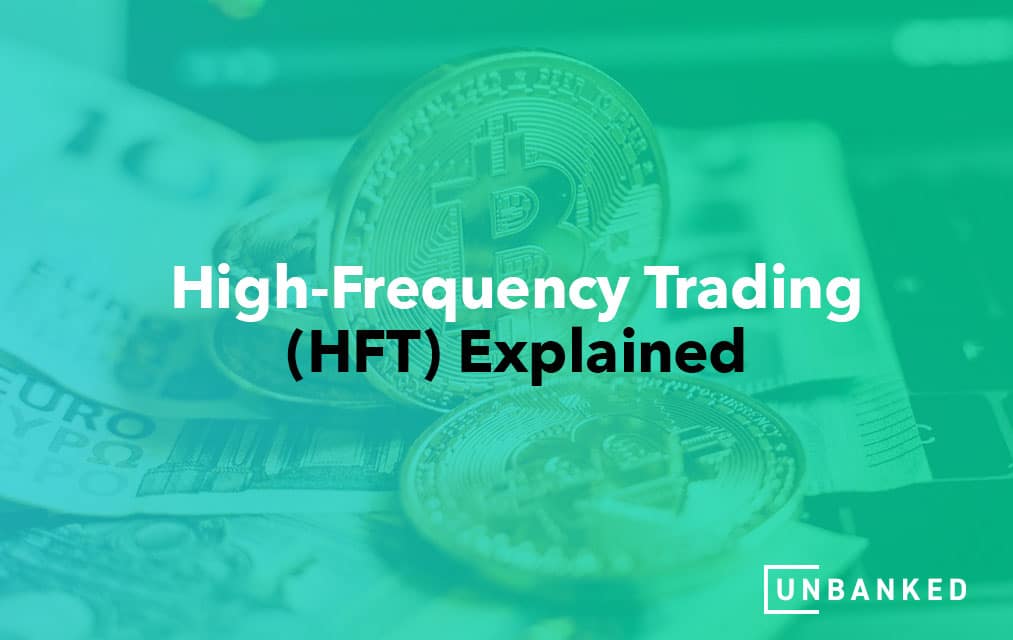By using low-latency reading technologies, supercomputing powers, and algorithms, high-frequency trading (HFT) takes advantage of market price inefficiencies to make a profit. HFT targets market instability, requiring investors to make higher trade volumes, which can be the most lucrative in these volatile markets. Is HFT always profitable, and is it the right option for all investors? Here are a couple of items to take into consideration.
Looking to learn more about the basics of Crypto? Check out our Crypto terms every investor should know.
What Is High-Frequency Trading (HFT)?
High-frequency trading is a method of trading that uses robust computer programs. These technologies transact a large number of orders in only a fraction of seconds. Using complex algorithms, HFT can analyze multiple rations and execute orders based on the current market conditions. Generally, those traders with the fastest execution speeds are more profitable than those with slower speeds.
Along with that high speed of orders, HFT is also known for its high order-to-trade ratios and turnover rates. HFT does add liquidity to the market and eliminates any small bid-ask spread. However, HFT has also been criticized over the years since it can give an advantage to those larger companies.
Related: How to Invest in Crypto (Without Buying Cryptocurrency)
Understanding High-Frequency Trading (HFT)
When the leading exchanges began offering incentives for companies to add liquidity to the market, HFT became more popular with investors. For example, the New York Stock Exchange has a group of liquidity providers known as Supplemental Liquidity Providers (SLP). This group attempts to add liquidity and competition for existing quotes in the exchange. Following the collapse of Lehman Brothers, the SLP was introduced when liquidity was a significant concern for many investors. The NYSE offers a rebate or pays any fee for providing that liquidity as an incentive. Since the exchange handles millions of transactions per day, there is a possibility for large profits.

Difference Between HFT And Algorithmic Trading
Algorithmic and high-frequency trading are often used simultaneously with each other. However, both the financial and technical environments are complex, and it can be easy to confuse these terms with each other. Algorithmic or automated trading is also called algo trading – also known as black box trading. These computerized trading solutions use a collection of execution methodologies and algorithms. With that, they can automatically place orders in the exchange or market after a quick technical analysis.
With these pre-programmed algorithmic trading instructions, the company can set specific trading instructions regarding certain parameters, such as volume, time, and market price. For example, argo trading may send “child orders” with a set execution algorithm to compensate for those large orders.
Related: How to Sell Your Cryptocurrencies
For investors to get the best price during a specific period, algo trading is ideal for dividing those large purchases into smaller ones. In an aggressive market, those smaller orders are often rewarded. Trading with hedge funds, investment banks, and mutual funds can find a few benefits with algorithmic trading.
Along with that, algo trading can reduce the danger of order execution and influence in the market. As a result, traders do not have to keep track of equities or manually deliver those smaller slices. Within algorithmic trading, you will find high-frequency trading. High-frequency trading can handle those small-scale trades and send them to the exchange at a faster rate of speed. When it comes to trading, the HFT is known as a market creator since it happens at a quicker pace.
High-frequency trading is also always encouraged in many markets. These HFT strategies are known for their ability to trade more quickly. While that may seem an advantage, HFT traders must continue focusing on those speed advantages rather than fine-tuning basic technology advancements.

Benefits of High-Frequency Trading (HFT)
HFT has improved liquidity in the marketplace, but it has also removed any bid-ask spreads that many have considered too small in the past. What is a bid-ask spread? This spread is the amount by which the asking price will exceed the bid price for any asset in the market. The bid-ask spread is known as the difference between the highest price someone is willing to pay for a purchase and the lowest price the seller will accept. In short, someone looking to buy will pay the ask price while the seller will receive the bid price.
The Profitability of HFT?
While HFT is available for all investors, they need to use advanced algorithms, but that can be only accessed for a high price. High-frequency trading might not be the best option for new investors. HFT is better suited for those institutional investors who know how to deal with unexpected outcomes and the volatility in the market. Yes, HFT can be profitable, but those newcomers should stick to manual trading to understand the market and gain experience. As traders start with day trading, they can slowly refine their strategies and work their way to using HFT.
Related: 7 Most Crypto-Friendly Countries for Investors
Critiques of High-Frequency Trading (HFT)
Over the years, HFT has been met with some criticism. This trading has replaced the broker-dealer relationship by using algorithms and mathematical models to make vital decisions. As a result, human interaction and dean have been taken out of the equation. These decisions are made in milliseconds, resulting in significant moves in the market. Additionally, HFT allows larger companies to profit off those little traders. Ghost liquidity is another type of criticism that has permitted HFT to be available in one second and disappear the next. With that, traders are unable to be able to trade this type of liquidity.
With any investment, learning the basics and understanding the drawbacks are crucial. HFT can be profitable, but mainly for those with experience in the market.
Do you want to build a stronger portfolio for your crypto investments? At Unbanked, we have solutions that may help increase your profits. Contact us today!





